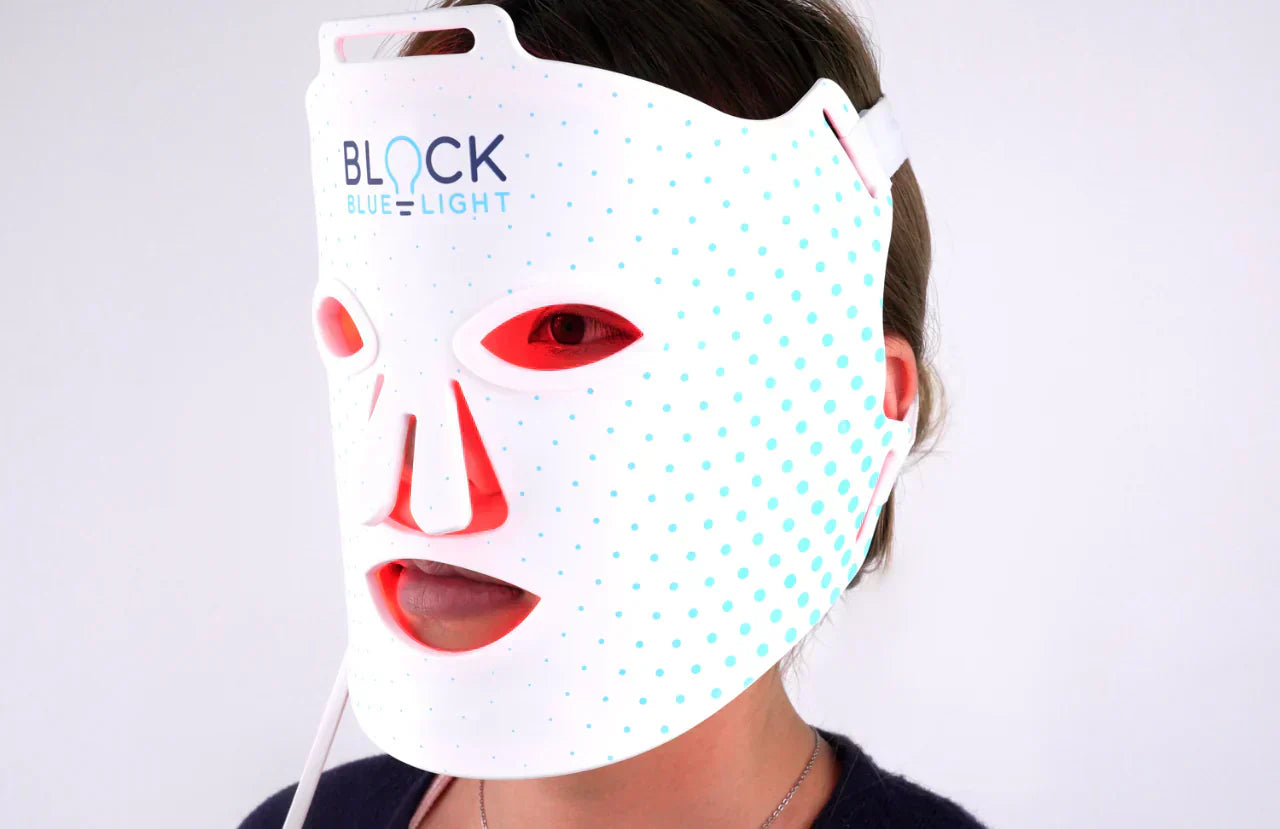Travel is one of life's great joys. Incredible advancements in transport have made it relatively easy to travel across multiple time zones and see the world. However, there's something we all hate about long-distance travel. Jet lag.
If you've travelled across time zones, you will have experienced this dreaded and exhausting problem. Whether you're on a business trip, travelling to a family event or going on holiday, jet lag can really impact the enjoyment of travel. It also makes it challenging to perform optimally when readjusting to life on your return home.
In this article, we'll explore the cause of jet lag and how you can beat it naturally.
What is Jet Lag?

You may be familiar with the feeling, but what actually is jet lag?
Jet lag — also known as circadian desynchrony — occurs when our natural body clock (circadian rhythm) is out of sync with the external environment.
Our body clock follows a 24-hour cycle according to the rising and setting of the sun. For example, our brains produce the sleep hormone melatonin in response to low light in the evening to prepare us for sleep.
When we travel to a different time zone, our circadian rhythm can't adjust quickly and becomes out of sync with the new location. This leads to all sorts of unpleasant symptoms, with the most common being sleepiness when we need to be awake and waking up during odd times at night.
Jet lag is worsened by age and tends to be more severe the more time zones that are crossed. It's typically worse when travelling across time zones to the east (1). Travelling east means that our circadian rhythm needs to be shortened, which is more difficult for the body than simply delaying it.
Symptoms of Jet Lag

Symptoms usually occur within 12 hours of arriving at the destination, and may include:
- Fatigue and lethargy
- Drowsiness during the day
- Poor daytime alertness
- Poor physical performance
- Irritability and changes in mood
- Confusion and inability to focus
- Mild digestive symptoms
- Insomnia and waking up throughout the night
- Hunger away from normal mealtimes or loss of appetite
- Headaches
These symptoms usually last a few days to a week.
We know that getting proper restful sleep is important for good health. So, by messing with our sleep, frequent jet lag can impact immunity and increase the risk of chronic health issues like diabetes, obesity and heart disease.
Interestingly, a 2005 study on flight attendants linked sleep rhythm disruptions to a higher risk of breast cancer (2).
Emerging research in animals and humans suggests that circadian rhythm disruptions can also change the composition of the bacterial microbiome in the gut (3). These gut microbes — like the rest of the body — are controlled by the body clock. Changes in gut bacteria could offer an explanation for why people who do shift work and have frequent jet lag are at higher risk for obesity and metabolic syndrome.
12 Tips to Beat Jet Lag Naturally
Keep reading to learn 12 simple tips that can help regulate your body clock quickly when travelling to minimise jet lag symptoms.
Change Your Routine Before You Leave
If you're embarking on long-distance travel, it's a good idea to start slowly adjusting to the new time zone before leaving. This could involve changing your watch, moving mealtimes and adjusting your bed time and wake up time in the days before departing for the trip.
Some people start by progressively waking up and going to bed an hour earlier or later in the few days leading up to departure. If travelling east, this involves going to bed earlier and rising earlier. If travelling west, rise later and go to bed later each day.
This is known as "phase shifting" and is proven to be helpful. A 2003 study on phase shifting when travelling eastward found that circadian rhythms shifted by roughly 2 hours in just three days (4).
It might not be practical to do this in all situations. In this case, changing your watch when you get on the plane will help you sleep and eat according to the new time zone and signal your brain to adjust.
Embark Well Rested

The days before leaving for a trip can be busy and stressful as you rush to pack, finish work and complete everything on your to-do list. This often results in late nights and the mentality of "I'll sleep when I'm on holiday".
It's a bad idea to start your trip across time zones when you are sleep deprived. It will only make it harder for your body to adjust to the new time zone and drag out the symptoms of jet lag.
Prioritize a good night's sleep the night before your flight to minimize jet lag.
Avoid Alcohol and Caffeine

Many people look forward to ordering a drink on the plane or relaxing at the bar when reaching the travel destination. Unfortunately, alcohol stops us from getting quality sleep and dehydrates the body. This is a double whammy because air travel is already incredibly dehydrating which adds to the feeling of exhaustion and causes jet lag to feel even worse (5). To beat jet lag it's best to avoid alcohol altogether before the flight, on the flight and the first day or two after arriving.
Caffeine can help with jet lag symptoms by making us feel more alert and energetic during the day. However, it disrupts sleep when consumed in the late afternoon or evening and also contributes to dehydration.
Instead, keep your body hydrated by drinking plenty of water, herbal teas and fresh juice when travelling. At least until you're feeling less jetlagged!
Bring Blue Light Blocking Glasses with You

 If you're travelling across time zones, you'll need a pair of tinted blue light blocking glasses.
If you're travelling across time zones, you'll need a pair of tinted blue light blocking glasses.
Our circadian rhythm is influenced by light exposure. If we're exposed to artificial light — especially bright blue light — it really messes with the sleep-wake cycle. And it certainly won't help your body adjust to the new time zone.
If you're flying in the evening or overnight, your eyes and brain are bombarded with light from fluorescent aisle lighting, seat lights, onboard TVs and gadgets to keep distracted like smartphones, tablets and laptops. This light tells the brain that it's the middle of the day and stops melatonin production. It's messing with your sleep schedule before you've even crossed time zones!
Fortunately, our trendy tinted glasses are guaranteed to block out all artificial light which makes them a must-have for long-distance travellers. You can reduce jet lag by wearing them during evening or overnight flights and at least two hours before bedtime at your destination. It will reinforce the message to the brain that it is night time.
Wear our red or orange-tinted glasses for a dramatic reduction in jet lag symptoms. They will do wonderers for regulating your circadian rhythm, encouraging melatonin production and getting proper sleep at night — the time you want to be sleeping!
Adjust Your Sleep Patterns
To minimize jet lag, it's important to immediately change your sleeping patterns to that of the new time zone.
It might be a challenge, as you'll likely be exhausted, but try to avoid long naps. Stay awake and only go to bed at a normal time for the new time zone.
You should also set your alarm so you don't oversleep in the morning as this can make you feel even more sluggish and disorientated.
For more tips of getting good quality sleep, read our blog on sleep hygiene.
Keep the Room Dark at Night
Optimise your production of the sleep-hormone melatonin by making sure your room at the destination is completely dark and free of all artificial blue light when you sleep.
Start by turning off all devices at least an hour before bed to allow your brain to wind down. Cover up any LED lights from devices and applications.
Many hotels use blackout curtains, which is useful, but you should invest in a sleep mask to use in case light from the environment is seeping into the room.
Finally, make sure you don't turn on any lights if you need to get up in the night. Instead, take a red light torch with you on your travels and keep it beside your bed. This red light will allow you to navigate around at night, but won't confuse your brain and stop melatonin production.
Use Earplugs

Noisy surroundings while travelling – Hello loud neighbours and screaming babies - can add to the difficulty of falling asleep, making insomnia from jet lag even worse. Our comfortable earplugs will help to block out noise and encourage peaceful sleep. They are extremely useful for creating a quiet environment to sleep on the plane when taking an evening or overnight flight. Let’s face it – silence on a plane is golden!
As an added bonus, earplugs can help to equalise the air pressure between the inner ear and outside environment, thus reducing earache and blocked ears while flying.
Try Melatonin

Falling asleep in a new time zone can be challenging and many people wake up at odd hours of the night unable to get back to sleep.
The temptation to take pharmaceutical sleeping pills may be strong, but these can actually worsen jet lag by causing more fatigue and disorientation.
Luckily, melatonin supplements are a natural and effective way to reset the circadian rhythm. Melatonin is the hormone that controls the sleep-wake cycle, and when we're jetlagged our melatonin production is out of sync.
A 2014 review of melatonin found strong evidence to suggest that it can prevent symptoms of jet lag and reduce insomnia (6).
It's recommended you take 0.5-5mg of melatonin 30 minutes - 2 hours before bedtime at your destination.
Get Natural Light

Getting natural light during the day — particularly in the morning — is a powerful way to regulate the circadian rhythm and shift your body clock to match the new environment. The body will take cues from the light to regulate energy levels, alertness, cortisol levels and melatonin levels.
Jet lag tends to manifest within a day or two of arriving at the destination. So, resist the urge to lie on the couch or sleep through your first day in the hotel. Getting lots of natural light on the morning of arrival — or the first morning after arrival — is the best way to nip jet lag in the bud.
Set your alarm to wake up early each morning and open the curtains to get natural light into the room. Follow this by going for a walk outside or exercising in the sun.
If you're in a cold, cloudy or rainy place, you may want to use a light box in the morning.
Exercise in the Morning

Exercise is a fantastic way to boost energy, improve mood, increase alertness and reduce symptoms of jet lag. Research has suggested that exercising outside on the days following arrival at the destination can speed up body clock synchronization (7).
You may not feel like it, but you can minimize jet lag by maintaining an exercise routine during the initial days of arriving at the destination. It will be even more effective if you exercise in the morning in natural light. If you can do this, you'll feel more energetic and less sleepy and your body clock will soon be in the correct time zone.
Adjust Your Mealtimes
Sleep is not the only thing that is controlled by the circadian rhythm. Hunger and digestion also depend on the body clock. This explains why people with jet lag can experience changes in appetite, irregular bowel movements and digestive complaints.
Studies have found that eating regular meals according to the new time zone can help to alleviate jet lag (8).
To speed up circadian synchronization, try to eat meals according to your new time zone. If you're hungry but it's not time for a meal yet, drink a large glass of water or stick to light snacks to keep your blood sugar stable. This is an important way to help your body readjust.
Eat More Prebiotic Fibre

As previously mentioned, jet lag can cause digestive symptoms and disruptions in the gut microbiome.
Keep the gut bacteria happy and the digestive system regular by eating sufficient prebiotic fibre and probiotic foods when travelling. This should include:
- Oats
- Beans and legumes
- Fruits (bananas are especially good)
- Vegetables
- Onions and garlic
- Fresh yogurt
- Fermented foods like sauerkraut and kimchi
Final Thoughts
The simple and natural tips outlined here will help you to "hack" your circadian rhythm, speed up the adjustment period and reduce the number of days wasted due to jet lag.
You'll soon be sleeping well, feeling energetic and enjoying your trip to the fullest!
Resources
- Jet lag impairs performance of major league baseball players. (2017). Available at: https://www.sciencedaily.com/releases/2017/01/170123153835.htm
- Kojo et al. (2005). Breast cancer risk among Finnish cabin attendants: a nested case-control study. Available at: https://www.ncbi.nlm.nih.gov/pubmed/15961626/
- Jet lag can cause obesity by disrupting the daily rhythms of gut microbes. (2014). Available at: https://www.sciencedaily.com/releases/2014/10/141016123522.htm
- Burgess et al. (2003). Pre-flight adjustment to eastward travel: 3 days of advancing sleep with and without morning bright light. Available at: https://www.ncbi.nlm.nih.gov/pmc/articles/PMC1262683/
- Travel tips: Ways to minimize jet lag. (2008). Available at: https://www.health.harvard.edu/newsletter_article/travel-tips-ways-to-minimize-jet-lag
- Herxheimer & Petrie. (2002). Melatonin for the prevention and treatment of jet lag. Available at: https://www.ncbi.nlm.nih.gov/pubmed/12076414/
- Shiota et al. (1996). Using outdoor exercise to decrease jet lag in airline crewmembers. Available at: https://www.ncbi.nlm.nih.gov/pubmed/8968481/
- Jet lag is given the swerve by adjusting meal times on the ground, find researchers. (2016). Available at: https://www.sciencedaily.com/releases/2016/10/161005084035.htm





